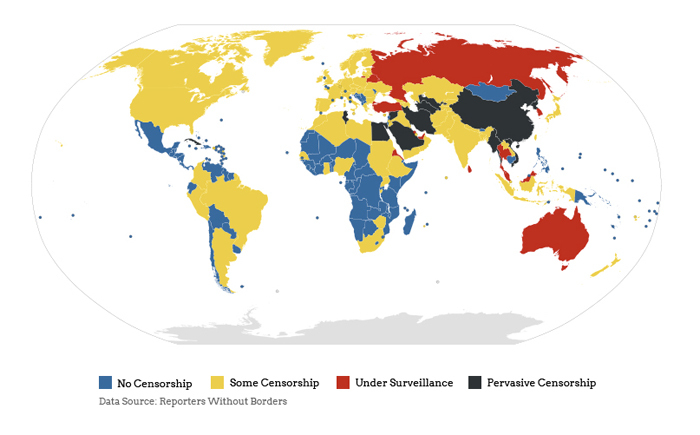Internet censorship
Overview
Internet Censorship is the action that prevents the publishing of, or accessing to information on Internet. Such action is often done by governments or organizations when they believe that the information is sensitive or harmful.
The opinions about the Internet censorship are opposing in different levels (from strongly disagree to very pleased). These opinions are dependent on the knowledge of a person as well as the censorship laws which varies on country-to-country basics.
Method of Applying Censorship
User report and request for removal: This action can be done by anyone who thinks that the content is inappropriate, such as harassment, sexual action, foul language on a website for children. The content will be removed completely if the report is accurate.
Hosting Company: use regulation law or informal request on hosting companies who then must send a deny service signal when user want to go to that specific website. In this case, it depends on the request; the content of the website may still remain untouched or be deleted.
Internet Service Provide: is often done in country-level where governments use their power and forcefully block the information. This method raises many concerns about the freedom of speech and freedom of information, because the blocked information may not be wrong.
Censorship of Some Countries
In United State
NETWORK NEUTRALITY 101: Why The Government Must Act To Preserve The Free And Open Internet (2010):[1] The Internet has become a deeply ingrained in the lives of most Americans. It looms so large, in fact, it is easy to imagine that it is immune to change — that it will always remain the free and open medium that it is now. But there are no such guarantees.
Internet Censorship is often conflicting with other exiting regulation or laws in US where human right and freedom are prioritized
Online Free Speech (2006)[2]: a clear victory for free speech, the Supreme Court has announced that it will not hear the government's appeal of a ban on the Child Online Protection Act (COPA), the federal law that would criminalize constitutionally protected speech on the Internet.
Online Censorship in the States (2002)[3]: In a sweeping victory for free speech rights in cyberspace, the Supreme Court struck down the Communications Decency Act in Reno v. ACLU in June 1997. The Court granted the highest level of First Amendment protection to the Internet, and cyber-activists are still dancing in the streets. Despite the Supreme Court's ruling, states are busy crafting censorship laws at home.
In Canada
Canada did not specifically regulate about the Internet content. However, local laws do apply to websites hosted in Canada. In 2006 major of Canadian Internet service providers (Bell, Bell Aliant, MTS Allstream, Rogers, Shaw, SaskTel, Telus, and Vidéotron) announced "Project Cleanfeed Canada" -- a voluntary act of blocking of access to hundreds of alleged child pornography sites.
But things had shifted in 2011
_ In Octorber 2011 the Supreme Court of Canada unanimously ruled that online publications cannot be found liable for linking to defamatory material as long as the linking itself is not defamatory.[4]
_ In December 13 and 14 2011, Internet Censorship case finally gets to Court [5]
In Australia
Australian gorvernment perhaps one of the most active gorvernment who want to put the Internet under surveillance of regulation. In Octobor 2008, the governing Australian Labor Party has proposed to extend Internet censorship to a system of mandatory filtering of overseas websites which are, or potentially would be, "refused classification" (RC) in Australia. This means that internet service providers would be required to block access to such content for all users. As of June 2010, legislation to enact this policy still has not been drafted.[1] The proposal to introduce mandatory filtering has generated substantial opposition, with a number of concerns being raised by opponents and only a few groups strongly supporting the policy.
References
- ↑ http://www.aclu.org/free-speech-technology-and-liberty/network-neutrality-101-why-government-must-act-preserve-free-and-
- ↑ http://www.aclu.org/free-speech/online-free-speech
- ↑ http://www.aclu.org/technology-and-liberty/online-censorship-states
- ↑ http://www.cbc.ca/news/politics/story/2011/10/19/pol-scoc-hyperlink.html
- ↑ http://canadianhumanrightscommission.blogspot.com/2011/05/internet-censorship-case-finally-gets.html
